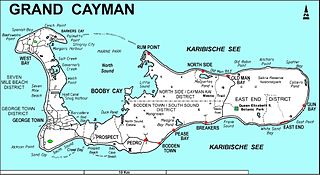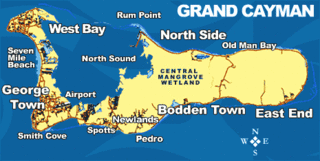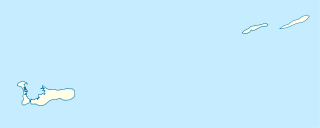 W
WThe Bluff is the highest part of the Cayman Islands, a British Overseas Territory in the Caribbean Sea. It stands at the eastern end of the island of Cayman Brac and has a maximum elevation of 43 m (141 ft).
 W
WBooby Pond Nature Reserve is a protected wetland on Little Cayman, one of the Cayman Islands, a British Overseas Territory in the Caribbean Sea.
 W
WThe Botanic Park and Salina Reserve Important Bird Area comprises two separate sites on Grand Cayman, one of the Cayman Islands, a British Overseas Territory in the Caribbean Sea.
 W
WThe Central Manrove Wetland is a large area of mangrove dominated wetland on Grand Cayman, one of the Cayman Islands, a British Overseas Territory in the Caribbean Sea. It is one of the territory's Important Bird Areas (IBAs).
 W
WThe Crown Wetlands lie on Little Cayman, one of the Cayman Islands, a British Overseas Territory in the Caribbean Sea. Collectively they form one of the territory's Important Bird Areas (IBAs).
 W
WThe Eastern Dry Forest lies at the eastern end of Grand Cayman, one of the Cayman Islands, a British Overseas Territory in the Caribbean Sea. It is one of the territory's Important Bird Areas (IBAs).
 W
WFrank Sound Forest lies near the southern coast of the East End district of Grand Cayman, one of the Cayman Islands, a British Overseas Territory in the Caribbean Sea. It is one of the territory's Important Bird Areas (IBAs).
 W
WFranklin's Forest lies near the centre of the East End distinct of Grand Cayman, one of the Cayman Islands, a British Overseas Territory in the Caribbean Sea. It is one of the territory's Important Bird Areas (IBAs).
 W
WMalportas Pond is a salt-water pond on the north coast of Grand Cayman, Cayman Islands, near North Side village. It has an area of 44 hectares or 52 hectares, and like the nearby Rock and Point ponds, it is an important area for breeding waterfowl. Local farmer Willie Ebanks introduced West Indian whistling-ducks on the pond in 1990, and it also has populations of heron, egrets, moorhens, and coots. It forms part of the Central Mangrove Wetland Important Bird Area, identified as such by BirdLife International because it supports populations of waterbirds.
 W
WMastic Reserve lies at the eastern end of the North Side of Grand Cayman, one of the Cayman Islands, a British Overseas Territory in the Caribbean Sea. It, with the associated Mastic Trail, is managed by the National Trust for the Cayman Islands and is one of the territory's Important Bird Areas (IBAs). It is named after the yellow mastic and black mastic trees which occur in the reserve.
 W
WQueen Elizabeth II Botanic Park is a non-profit outdoor garden and wildlife facility located in the North Side District of Grand Cayman Island in the British West Indies. The park is owned jointly by the Cayman Islands Government and the National Trust for the Cayman Islands, a group dedicated to preserving natural environments and places of historic significance in the Cayman Islands. Opened in 1994 with only the Woodland Trail completed, the park now also contains the Floral Colour Garden, a Cayman Heritage Garden, a lake, an orchid boardwalk exhibit, and a Blue Iguana Habitat. Also inside the park is a gift shop and a visitor's interpretive center, the starting point from which visitors can enter the Woodland Trail and other garden grounds.
 W
WSparrowhawk Hill lies in the centre of Little Cayman, one of the Cayman Islands, a British Overseas Territory in the Caribbean Sea. It is one of the territory's Important Bird Areas (IBAs).